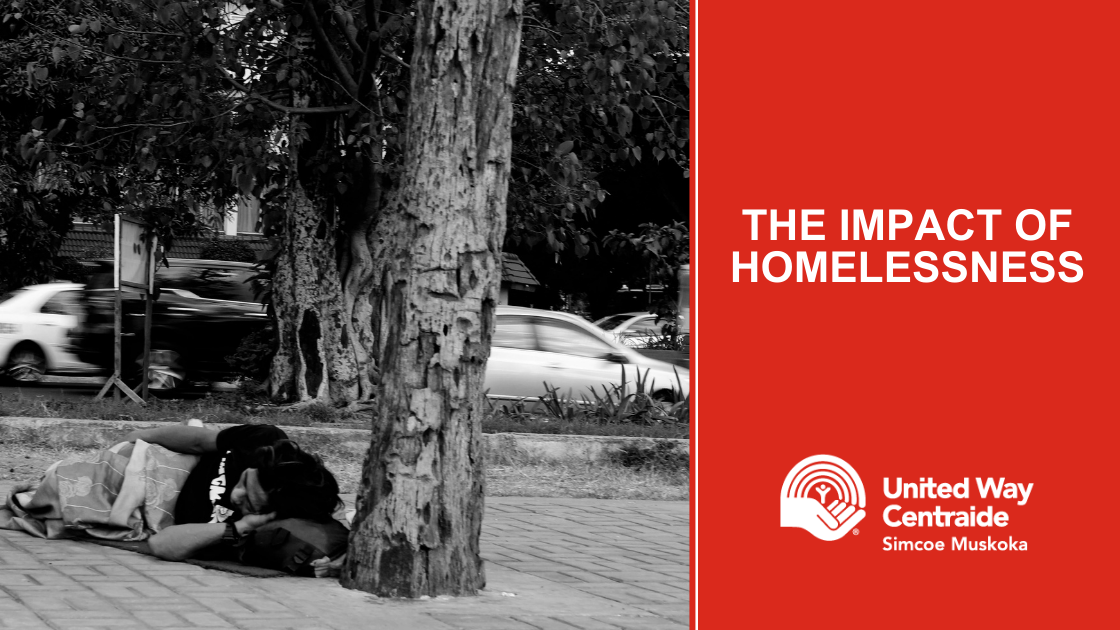
04 Oct The Impact of Homelessness?
This year, World Habitat Day was on Monday, October 4 and World Homelessness Day is on Sunday, October 10. While this year’s World Habitat Day theme tackles the issue of sustainability and renewable resources used in housing, we wanted to take this time to reflect on housing in Simcoe Muskoka.
What is the Problem?
In Simcoe Muskoka, there are more than 700 people experiencing homelessness or precarious housing. This includes people living unsheltered (on the streets), in emergency shelters, in motels paid for by family, in transitional housing, in institutions and those who are couch-surfing or living rough.
In Simcoe County, 54% of those who participated in the most recent survey for the 2020 Homelessness Enumeration Report attributed their homelessness to past trauma or abuse. Nearly half of participants reported not having access to at least one basic need: food, water, a bathroom, a place to sleep, laundry, a shower or storage. One in two Simcoe County residents experiencing homelessness have been threatened with violence, and nearly 25% have reported resorting to extreme measures like running drugs, sharing a needle or exchanging sex for things like money, protection or a place to stay.
Among Simcoe County participants, 31% self-identified as Indigenous, 11% as LGBTQ2S+, 67% had faced mental health challenges and 61% reported a substance use issue. To read more about the status of homelessness in Simcoe County, click here to view the 2020 Enumeration Report.
In Muskoka, 142 residents reported experiencing homelessness or precarious housing. 17% of those self-identified as Indigenous, despite Indigenous peoples only comprising 3.7% of the population of Muskoka. When it comes to shelter, those who were surveyed for the 2018 Enumeration Report primarily reported living with others, in motels or hotels or shelters. Tragically, only 4% reported living in transitional housing and more than 1 in 10 respondents lived in makeshift shelters, vehicles or “places not meant for human habitation.” The same number of people reported that, though they were in a shelter, they were on the verge of being evicted.
Among the Muskoka Enumeration participants, 42% said that abuse or family conflict led to their homelessness. In addition, 58% have an acute or chronic health condition, 27% struggle with addiction and 51% identified mental health concerns. You can read more in the 2018 Muskoka Enumeration Report.
Beyond the apparent issues with shelters and housing that our communities and their residents face, homelessness brings a whole host of other obstacles. Homelessness, as an extreme form of poverty, is linked to physical and mental health challenges, increased risk of suicide, malnutrition and food insecurity. Furthermore, basics that most of us take for granted—a cell phone to keep in contact with loved ones or to get a job interview, a mailing address to just access community resources, decency in the face of stigma and prejudice—are disrupted or made inaccessible due to homelessness.
What is the Solution?
Unfortunately, in the face of so much hardship, the answer to housing isn’t so simple. There are strides being taken throughout our communities, but tackling homelessness and housing requires more than just shelter. Still, it is a good first step.
In Simcoe County, 32 new Secondary Suites were created in 2020, bringing the total in the region to 169 suites created since the introduction of the program in 2014. The Secondary Suite initiative is a program that provides grants to homeowners to renovate part of their home in order to rent it out as part of the County of Simcoe’s affordable housing strategy. The County of Simcoe also funds urgent home repairs and accessibility modifications to help prevent people from being forced out of their homes.
In the District of Muskoka, the Emergency Assistance Fund is there to help people experiencing homelessness, though it does require an application to be submitted by phone or email. For those who don’t have access to those means of communication, one of the shelters can assist in the application process.
Even before the pandemic, United Way Simcoe Muskoka acts as the Community Entity for Reaching Home Rural and Remote, a Government of Canada initiative to reduce homelessness. Just last year, we reviewed and approved 78 projects across the rural areas of Ontario that provide shelter or resources for those experiencing homelessness, culminating in more than $5.5 million in funding across the province. This resulted in:
1,337 people placed into housing units
100 cases of emergency rental supports
199 cases of income support
623 people with disabilities supported
145 Indigenous people supported
284 children supported
800 youth (12-30) supported
803 adults supported
96 seniors supported
Though we are working with incredible groups like the Simcoe County Alliance to End Homelessness and the Poverty Reduction Task Group, we know it will take more than just one initiative or a municipality to help end homelessness once and for all.
So what can you do?
Take time to commit to making your community one where everyone can feel safe, with four walls around them and a roof over their head. Though an election just passed, reach out to your MP and MPP to show how important housing and shelter is to you. Reach out to your city or town council, or offer to volunteer at a local organization. Share the word on social media to let everyone know how important supports like transitional and affordable housing units are. Break the stigma of homelessness, mental health and addiction.
We know it will take all of us to make homelessness a thing of the past. What part will you play?
If you want to learn more, check out some of these great resources:
Canadian Alliance to End Homelessness



Sorry, the comment form is closed at this time.